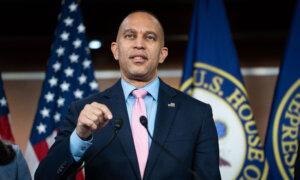President Donald Trump said military action in either case is unlikely, but said he’s less certain about Greenland.
President Donald Trump on May 4 ruled out using military force to annex Canada, but said he wasn’t ruling the possibility out in the case of Greenland.
During an interview that aired Sunday on NBC’s “Meet the Press,” anchor Kristin Welker asked Trump whether he would rule out military force against Canada. Trump replied, “I think we’re not going to ever get to that point. Something could happen with Greenland. I’ll be honest, we need that for national and international security.”
“But not with Canada?” Welker asked.
“It’s highly unlikely,” Trump replied, laughing. “I just don’t see it with Canada, I have to be honest with you.”
Trump said that action against Greenland was also unlikely, but added he could see circumstances where he would be open to it.
“I don’t rule it out. I don’t say I’m going to do it, but I don’t rule out anything,” Trump said.
“We need Greenland very badly … for international security,” he added, promising that the United States would “cherish” the “very small amount of people” currently inhabiting the Arctic mega-island.
“We have Russian boats and we have Chinese boats, gun ships all over the place—aircraft carriers, gun ships—going up and down the coast of Greenland. We need that to be protected. Internationally, we need it.”
Canada
Following his election in November, Trump stirred the international community after he expressed interest in reclaiming U.S. control over the Panama Canal, obtaining control of Greenland, and potentially absorbing Canada as the 51st state.
During the interview, Trump maintained that he was serious about the proposal and believed it would be to both countries’ benefit.
Asked whether he would discuss the prospect of adding Canada to the United States with newly elected Canadian Prime Minister Mark Carney, Trump replied, “I’ll always talk about that.”
“If Canada was a state it wouldn’t cost us. It would be great,” he said.
Speaking about a hypothetical map after a U.S.–Canada merger, Trump said, “I’m a real estate guy at heart. When I look down at that [map] without that artificial line that was drawn with a ruler many years ago … What a beautiful country it would be.”
The United States, meanwhile, would gain from Canada not being reliant on it when it comes to defense spending while existing as a separate country.
“Canada [spends] less money on military than practically any nation in the world,” Trump said. “They pay NATO less than any nation. They think we are subsidizing, they think we are going to protect them—and really, we are—but the truth is, they don’t carry their full share, and it’s unfair to the United States and our taxpayers.”
Greenland
Much more of Trump’s geopolitical attention in the western hemisphere has focused on Greenland.
Trump has long had ambitions to add Greenland as a U.S. territory, first floating the idea of purchasing it from Denmark, which currently has control over the territory, in 2019 during his first term.
There are several reasons for his interest in the sparsely populated Arctic island.
Gaining American control of Greenland has been a central focus of Trump’s foreign policy, which has been compared to the Monroe Doctrine in its focus on increasing American influence on Western Hemisphere geopolitics.
Russia’s northern coastline circles the Arctic, and the adversary has long taken an interest in the region.
Since October, the two leading U.S. rivals have been conducting joint patrols in the region, an escalation from China’s previously minimal involvement with Arctic affairs.
Vance said Denmark, which currently rules Greenland, has not “devoted the resources necessary to keep this base, to keep our troops, and … to keep the people of Greenland safe from a lot of very aggressive incursions from Russia, from China, and other nations” in the region.
Aside from that, Pituffik Space Base is crucial to America’s missile defense strategy, as the Arctic represents the shortest distance an ICBM missile would need to fly to strike the U.S. mainland.
China currently dominates the international market over several of these, making the United States heavily reliant on its leading adversary in this domain.
The area also neighbors several crucial shipping and strategic channels in the Arctic, increasing its potential value to the United States.
Original News Source Link – Epoch Times
Running For Office? Conservative Campaign Consulting – Election Day Strategies!


